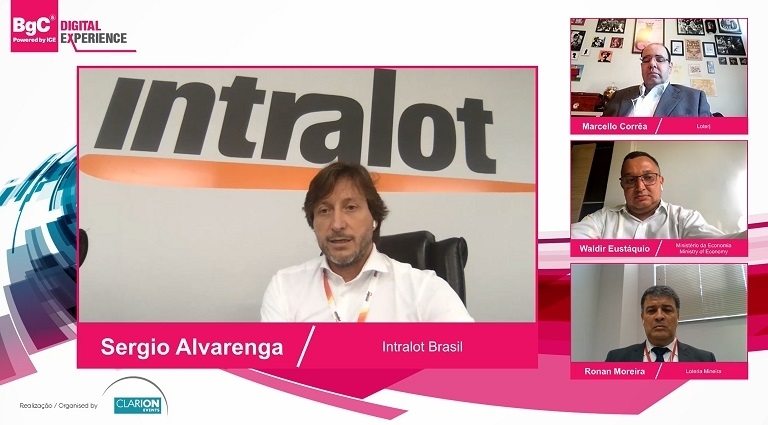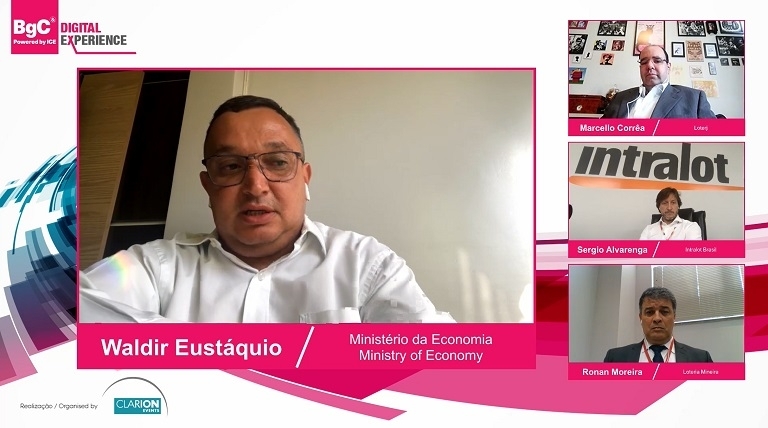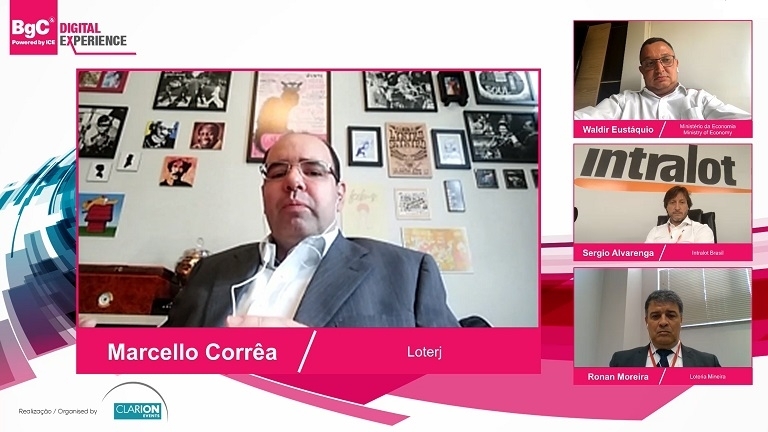

“Three issues are important and will be discussed at our meeting. The first is regarding state lotteries in the new scenario, after the end of the Union monopoly for the operation, the business and prospects for profitability in the sector and regulation at the state level,” said Marcello Corrêa. The moderator recalled that with the decision of the STF, each state will be able to regulate its lottery and operate in the segment, exploring the activity in the best possible way. "We hope that there will be no craziness or setbacks," he said.
Corrêa asked Ronan Moreira about the social role of a state lottery. The director of Loteria Mineira stated that the purpose of the company he runs is to generate resources and allocate them to the promotion of social welfare in projects managed by the state government. “Over the past 97 years of playing games uninterruptedly, Loteria Mineira resources have been invested in the construction of hospitals, football stadiums and destined to social programs for those who need it most. We allocated R$ 33 million to fight the COVID-19 pandemic in our state. It was a great pride that the Lottery was prepared when the governor needed it. We made a contribution to the Social Health Fund and the resources were used to fight the coronavirus,” he said.
The director of Loteria Mineira stated that the STF decision brings the environment of healthy competition and legal certainty. "However, it is very important that public managers pay attention to all the existing regulations so that everything is in compliance with the legislation." Ronan took the opportunity to say that “I make Loteria Mineira available to the market. I have already had conversations with some secretaries from some states willing to resume their lotteries and we can share a lot of consistent information so that other states can operate their lottery activities.”

Corrêa took advantage of Ronan Moreira's offer and also made Loterj available to the states, at the same time that he asked Waldir Marques Jr. about how the SECAP Undersecretary sees the collaboration of the Ministry of Economy in the current scenario for state lotteries.
Waldir Marques Jr. said that the STF's decision was a watershed, as it brought legal certainty to the lottery activity, both for the Union and for the States. “We are all waiting for the judgment to be published, but it is clear that States will have a powerful source of revenue, being well exploited with security and transparency. That decision was fantastic, and the government has been working to foster competition for some time.”
Corrêa asked Sérgio Alvarenga, as a private agent and director of a company with great international experience like Intralot, about which games would be most attractive and how much regionalism could influence the choice of these games: “The lottery game options we have in our portfolio require some studies to define by state what the priorities would be. In Brazil there are many regional characteristics, but we know which are the most successful modalities in the world and in Brazil. Keno Minas is a very successful and traditional modality. We already have an idea of the breadth of what can be done and we are attentive to the opening of new modalities.”
The best way for states to attract investment
The CEO of Intralot Brasil said that the operation in Minas Gerais is a successful model and highlighted that the country has a very well-made concession law and that it not only brings security to the state, but also to investors. “This is extremely necessary for the State to be able to explore in a solid way and with positive results in the opening or resumption of its lotteries. Thus, it is not possible to escape much of a bidding process for the concession with a long term of operation,” explained Sérgio Alvarenga.

The moderator asked Waldir Marques and Ronan Moreira to comment on Alvarenga's response from the point of view of the remuneration of the private entity and the public entity in a concession process. "It is important to know the size of the market to point out such issues and I would like to know if the Ministry of Economy has studies on the size of the state markets or of Brazil as a whole."
Waldir commented that a concession process takes into account specific studies for decision making. “Today, the Ministry of Economy does not have studies on the states, not least because before the STF decision, it was not our focus to assess local possibilities. Some important points are the ‘valuation’ of the operation and its economic and financial framework, as well as the legal one. I make a very big alert about the legal framework, since it is important for everyone involved to analyze the decision of the STF decision,” he explained.
Ronan Moreira commented that “Loteria Mineira's technical team has always focused on market research and new practices, and within this aspect I would like to highlight the importance of Games Magazine Brasil, which brings us daily technological advances, mergers and the achievements of large companies, which gives us a clear view of what happens in the market. Now, with the decision of the STF, our technical area continues to operate internally, but we are implementing a different pace. If we decide to move forward in some sense, we will obey all legal regulations, deadlines and carry out processes with all transparency, which is common to the State of Minas Gerais,” he said.
New models of interaction with players and technologies
“Intralot is a technology company and our main focus is to use all of our expertise in the lottery market. We always seek attractiveness, design and new modalities of games and sports betting, where it is possible to act during an event. Regarding the physical market, it will continue to exist and be added to the digital world. It is traditional all over the world to choose and analyze odds of events physically and then process in the digital world. That's what happens with Keno, but I see great advances for the instant lottery. We need attractive products, both physical and digital. It would also be very interesting for the states to work with the points of sale that exist today with the Caixa Econômica Federal lottery network,” said Alvarenga.
Best payouts
Waldir Marques commented that the possibility of the lottery network selling products exists, and that this will still be analyzed more concretely in the near future. “I see that the States should analyze, from the publication of the judgment, the payout. To sell the lottery, there is an important tripod. The payout should be attractive, the more points of sale the better, and the advertising. With this tripod very secure, the business will be more successful,” said Waldir Marques Jr.

As was questioned by Marcello Corrêa about the existence of several betting companies already operating in Brazil, the director of SECAP stated that all operators should be brought into law within a regulated environment. Sérgio Alvarenga reinforced that Intralot has this vertical, but that so far it has not brought sports betting as it understands that as a publicly traded company it must respect the laws, and that for this reason the regulation of the activity will give the way for the operation of this new modality.
"There is no market for low payout," said Alvarenga to reinforce Corrêa's comment about the possibility of increasing the payout and about the current model in force in the operation of CEF lotteries. “The Union has already shown its understanding that good payouts are important to make them attractive. It happened in the discussions on sports betting, when changes to the law were proposed to increase the payout. The game needs to be attractive, and we saw that in the lotex process as well, where the payout was much higher than that practiced in Caixa lotteries,” he commented.
Final considerations
Ronan Moreira thanked Clarion for the invitation, Marcello Corrêa for mediating a high-level debate and the presence of Waldir Marques and Sérgio Alvarenga. “There will be no conflicts between federal and state regulations. It will be up to each government to choose the regulation of the federal law and each representative to establish the rules to be obeyed by the States,” he said.

Sérgio Alvarenga thanked everyone for their presence and pointed out that he is very optimistic about the Brazilian lottery market: “I know that other international players will come to dispute the lottery market in the country and that is extremely healthy. We live this all over the world and we know that the big beneficiaries are the gamblers and the governments that collect. I’m very optimistic about the future. We at Intralot will be prepared to dispute over the new legal framework left to us by the STF. And there is a special message that it becomes even irresponsible for governments not to explore their lotteries and collect. States need new sources of revenue.”
Waldir Marques Jr. left as a final message a request to make the decision (of the STF) “a great opportunity to do the best and have something that bears positive fruit for the States, obeying the legislation and observing all the criteria so that there is no no insecurity,” he concluded.
Source: Exclusive GMB